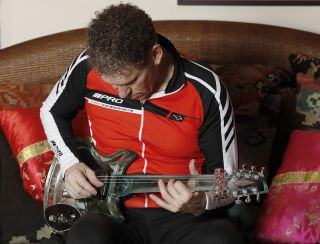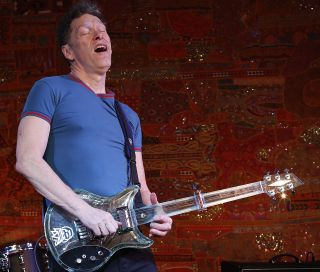Virtuosos in music manifest in diverse forms, each wielding unique instruments and styles. Ned Evett stands out as a prime example, his musical weapon of choice being as distinctive as his innovative playing technique: the fretless glass-necked guitar. This unique instrument has not only shaped his sound but also carved a niche for him in the guitar world.
“Fretless glass-necked guitars are complete instruments, akin to a pedal steel in their expressive capabilities,” Evett explained in a recent interview. “They come with their own set of challenges and rewards, most notably a steep learning curve.” It’s this very challenge that Evett embraced and conquered, leading him to share his expertise at Joe Satriani’s prestigious G4 Experience music camp. There, he had the distinguished opportunity to demonstrate his unique fretless guitar style to music icons like John McLaughlin, Sting, and Dominic Miller backstage.
“The years dedicated to mastering the fretless guitar and developing my personal songwriting style felt entirely validated in that moment,” he reflected. “I’m incredibly enthusiastic about hitting the road and showcasing the vast potential of a fretless Glass Guitar.”
His forthcoming album, Strange Kind of Freedom, promises a sonic journey filled with blistering shredding, soulful melodies, and, of course, the unmistakable voice of his fretless glass guitar. Evett humorously notes the humbling experience many guitarists face when first encountering his instrument: “Often, guitarists pick up one of my rigs expecting their fretted skills to seamlessly translate, only to find their egos slightly bruised. However, some individuals instantly connect with it and are inspired to explore its possibilities further. Erin Coburn, for instance, picked up a glass guitar at G4 and immediately sounded remarkably musical.”
Beyond performing, Evett is also a dedicated educator, keenly observing trends and developments in the guitar world. This perspective allows him to offer insightful commentary on various topics, including the evolution of the guitar solo in contemporary music.
In Defense of the Guitar Solo: A Human Element in Music
Addressing the debate around whether guitar solos have lost their way, Evett offers a refreshing perspective. “I don’t believe a guitar solo, as a form of musical expression, is inherently more excessive than a lead vocal,” he argues. “They can be a vital component of a great song. Moreover, considering they are performed by humans, not AI, I remain a devoted fan!”
 Ned Evett
Ned Evett
Image: Ned Evett showcasing his signature fretless glass guitar, highlighting the instrument’s unique neck and design.
Strange Kind of Freedom: The Genesis of an Album Inspired by the G4 Experience
Delving into the origins of his new album, Strange Kind of Freedom, Evett reveals the pivotal role of Joe Satriani’s G4 Experience. “I was invited to teach a fretless guitar class at the 2023 G4 Experience in Las Vegas,” he recounts, “spending an incredible week alongside guitar luminaries like Joe Satriani, Steve Lukather, Steve Morse, Cory Wong, Nili Brosh, and Eric Gales.”
This immersive environment proved to be a fertile ground for creativity. “I felt incredibly inspired and immediately began writing new material, drawing upon fretless riffs I had developed specifically for the G4 camp. I wrote and demoed around 20 songs in collaboration with the lyrically gifted Cherian Jubilee, who also played a crucial role in the development of my fretless glass fingerboards.”
Visualizing Sound: The Sonic Landscape of the New Album
When asked about the sonic direction of Strange Kind of Freedom, Evett describes a vivid and dynamic process. “‘Swirl’ is indeed a fitting word to describe the creative process!” he laughs. “I envisioned creating expansive songs that would resonate with guitar enthusiasts at an outdoor festival – pieces that are both accessible and intricate, much like the track Make Way For LaBuda.”
A key element in shaping the album’s sound is the Dunlop Clamp/Slider, a device Evett himself created. “I utilized the Dunlop Clamp/Slider on every track, for both rhythm and lead parts. Dunlop generously provided me with ten different slides, and I experimented with a different type for each song, adding subtle nuances to the overall tone.”
 Ned Evett
Ned Evett
Image: A close-up of Ned Evett playing his fretless glass guitar, demonstrating his technique and the smooth surface of the glass fretboard.
The Allure of Glass: Why Fretless Glass-Necked Guitars?
Evett’s journey into the world of fretless glass guitars began with an early inspiration. “I was captivated by Adrian Belew playing fretless guitar with King Crimson on MTV as a kid. I was instantly hooked,” he shares. This early fascination came full circle when Belew produced Evett’s Treehouse album in 2012. “That was an absolute thrill.”
His transition to exclusively playing fretless guitars led to a practical challenge. “After committing solely to fretless playing, I started to experience significant wear and tear on my wooden fingerboards. Glass fingerboards emerged as the perfect solution to this problem, offering incredible durability.” His pioneering spirit led him to modify a Fender Bullet, with Rob Renick’s help, into his first electric fretless guitar featuring a glass fingerboard.
Fretless vs. Traditional: A Unique Playing Experience
Evett elucidates the distinct demands of playing a fretless guitar compared to its fretted counterpart. “Fretless guitar demands constant, real-time adjustments to tuning for both chords and melodies. The ear training and muscle memory required are highly specialized. Having played fretless exclusively for 30 years now, I deeply appreciate the unique sonic character it brings, especially when combined with even-tempered instruments like keyboards. The microtones truly come alive!”
He further elaborates on the harmonic richness: “When I play solos, the overtones of the underlying major chord resonate beautifully beneath the lead lines… I’m captivated by its inherent harmonic sound.”
Beyond Boredom: A Dedication to the Fretless Path
When asked if traditional guitars now seem uninspiring, Evett clarifies his unwavering commitment. “Every guitar I currently own and play is fretless with a glass fingerboard. However, my appreciation for skilled guitar playing, whether fretted or fretless, remains undiminished.”
A History of Innovation: Guitar Brands and Custom Creations
Evett details his journey with various guitar brands in his quest for the perfect glass guitar. “Initially, I was endorsed by Fernandes, followed by Peavey, and most recently, Ibanez, who crafted my signature Null Guitar. Each of these companies provided me with production models, which I then modified with glass fingerboards.”
A significant milestone occurred recently with Morningstar Guitars. “Last year, Morningstar Guitars custom-built me a Solid Glass Fretless model, which was a game-changer. Currently, I utilize 11 guitars in my studio work and live performances.”
Ned Evett | “Trinity Footprints” Fretless Glass Guitar Version – YouTube  Ned Evett |
Ned Evett |
Image: YouTube thumbnail of Ned Evett performing “Trinity Footprints” on his fretless glass guitar, showcasing his virtuosity.
From Modification to Music: A Shift in Focus
Reflecting on his past ventures, Evett mentions a period where he modified guitars for others. “In the 2000s, I ran a company specializing in custom glass fingerboard guitars. Notably, in 2006, I modified a Stratocaster for John Frusciante.”
However, his passion ultimately led him back to performing. “Ultimately, I realized my true calling was in creating and playing music, not managing a business. So, I made the decision to close the company in 2010 and fully dedicate myself to my artistic pursuits.”
The Art of the Riff and Solo: Crafting Musical Narratives
Evett provides insight into his songwriting process, particularly his approach to riffs. “Riffs often emerge spontaneously during warm-up sessions or while tuning. I make sure to capture these ideas by recording them on my phone. Later, when I’m in songwriting mode, I revisit these recordings as starting points.”
His preferred tuning also plays a key role. “I exclusively play in open E major tuning [E B E G# B E]. This tuning naturally leads me to explore the powerful root-to-fifth relationship between the low E and B strings. Playing the bottom three open strings creates an instant power chord.”
Regarding solos, Evett views them as integral to storytelling. “My solos serve as emotional vehicles to enhance the narrative of the song. My favorite solo on the new album is on the title track, Strange Kind of Freedom. The song explores the paradoxical nature of truly forging your own path and the sacrifices it entails. For me, the uniquely expressive lines of the fretless guitar perfectly capture that complex feeling.”
 Ned Evett
Ned Evett
Image: Ned Evett in action, passionately playing a guitar solo on his fretless glass guitar, emphasizing the emotional depth of his music.
He further details the fretless guitar’s contribution to his soloing style: “When I solo on the fretless, the sympathetic overtones of the major chord resonate beneath the lead lines, creating a rich harmonic texture that I love. Instead of bending strings across the fingerboard as on a traditional guitar, I bend notes up and down the string, similar to playing a sarod or slide guitar.” He also acknowledges fingerstyle guitarists as an influence, “I often employ fingerstyle techniques, drawing inspiration from Mark Knopfler, who has profoundly influenced me both as a songwriter and a musician.”
Mastering the Fretless: Techniques and Tone
Evett reveals the technical innovations he developed to overcome the challenges of fretless playing. “The primary challenge is treble string sustain. To address this, I pioneered the use of glass fingerboards, sustainer pickups, left-hand nail slides, and my Dunlop Clamp Slider to maximize sustain.”
He also developed a systematic approach to fretless chords. “I created a standardized system of chords based on the Nashville system (I, II, III, IV, etc.). This system enables me to create lush, resonant chords in any key, which is essential for me as a recording and performing singer-songwriter. Moreover, this system ensures I never need to retune my guitar onstage.”
Evett shares his amp preferences for achieving his signature tone. “I am a dedicated Vox user. My affinity for the ‘crystalline dirt’ sound stems from my admiration for Brian May of Queen and The Edge of U2. Strange Kind of Freedom was recorded using a Vox AC15 and a Vox MV50 for a direct line. For close miking the AC15 cabinet, I used an SM7 microphone into an N-Sonic preamp. I particularly love the amp reverb on the AC15.”
Ned Evett Fretless Guitar Unboxing – YouTube  Ned Evett Fretless Guitar Unboxing – YouTube
Ned Evett Fretless Guitar Unboxing – YouTube
Image: YouTube thumbnail showcasing Ned Evett unboxing a new fretless glass guitar, highlighting the excitement around his unique instruments.
Pedalboard Essentials: Keeping it Dynamic and Expressive
Regarding effects pedals, Evett favors a streamlined approach. “I don’t rely on a massive pedalboard; often, I use a fly rig with just the essentials. My go-to pedals include the MXR Joshua Echo, Paul Reed Smith Mary Cries Compressor, Nobels ODR Mini Overdrive, Mooer Tremolo, and an Electro-Harmonix Pitch Fork for octave effects. I position the Nobels overdrive pedal after my echo pedal, which creates a dynamic, breakup-type sound even at lower volumes.”
Standing Out from the Crowd: Advice for Aspiring Musicians
Finally, Evett offers valuable advice for musicians seeking to establish their unique voice. “The key is to show up prepared and take calculated risks with your music, while prioritizing your well-being. Building a distinctive identity can be a challenging journey. Sometimes, opportunities may favor those who play it safe artistically. However, no one should be criticized for pursuing their passion with a guitar in hand and making a living doing what they love.”
